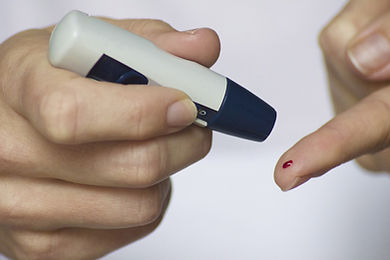Oakville & Milton Naturopathic Doctor


DIABETES & CHOLESTEROL
Value we offer:
-
Specialized blood work panels
-
Proactive & comprehensive screenings
-
Prevention & management of complications
-
Science-based supportive natural therapies
-
Professional & practical dietary planning
-
Education & personalized health coaching
What Is Diabetes Mellitus?
Diabetes Mellitus is a chronic endocrine disease that disrupts the body’s natural ability to regulate blood sugar levels. After a meal, the pancreas normally secretes insulin, a hormone that helps move the sugar glucose from the bloodstream into your cells to be used for energy. This intracellular shift of glucose lowers sugar levels in the blood. In diabetes however, the body either does not produce enough insulin or cannot use it effectively to move glucose into cells, leading to elevated blood sugar levels. Over time, elevated blood sugar levels can start damaging the kidneys, eyes, nerves, and other organs, which is why early detection and management of diabetes is critical.
There are three main types of diabetes.
Type 1 Diabetes: An autoimmune condition where your immune system destroys insulin-producing cells in your pancreas, resulting in little to no insulin being secreted. Most cases of type 1 diabetes are diagnosed in childhood, and these individuals require daily insulin injections to stay alive.
Type 2 Diabetes: This is the most common type of diabetes, affecting over 500 million people worldwide! In type 2 diabetes, the pancreas continues to produce insulin; however, the body becomes resistant to its effects, making it harder for glucose to move from the blood into the cells. Mild to moderate cases can often be managed effectively through healthy eating, regular physical activity, and various diabetes medications, while more advanced cases may require insulin injections.
Gestational Diabetes: This type of diabetes develops during pregnancy and typically resolves after childbirth. However, women who experience gestational diabetes have a higher risk of developing type 2 diabetes later in life and must be monitored more closely.
What is Cholesterol?
Cholesterol is a waxy substance found in every cell of the body. It plays an essential role in building cell membranes, producing hormones, and making vitamin D and bile acids. Cholesterol itself isn’t inherently harmful; problems arise only when its levels become too high.
The liver naturally synthesizes cholesterol in the body, but we can also get cholesterol from dietary sources such as meat, eggs, and dairy products. Medications and natural health products that lower cholesterol work mainly by either reducing its production in the liver or decreasing its absorption in the intestines.
Although there are many types of cholesterol molecules, they are generally classified into two main groups: “bad cholesterol”, or LDL, and “good cholesterol”, or HDL. High levels of bad cholesterol in the blood can deposit on the inside of your arteries, increasing the risk of coronary heart disease, heart attacks, and stoke. Alternatively, having adequate levels of good cholesterol in the blood helps remove some of these deposits and is protective against coronary artery disease.
Maintaining a healthy diet and regular exercise are key to keeping cholesterol levels in check. However, cholesterol-lowering medications may be necessary when lifestyle changes alone are insufficient. Large clinical trials have shown that statins, the most commonly prescribed cholesterol-lowering drugs, can reduce the relative risk of cardiovascular events by over 25%, with the benefit increasing the longer they are taken. This can be particularly significant for individuals with a high risk for cardiovascular disease.
The Pillars of Holistic Diabetes & Cholesterol Management

Natural Medicines
Herbal medicines
Supplements
Vitamins
Proactive Prevention
10-year risk calculation
Complications screening
Regular monitoring
Education & safety
Clinical Assessments
Comprehensive blood work
Specialized blood work panels
Physical examinations
Eye exam
Diet & Lifestyle
Clinical dietary planning
Carbs/ protein/ fats
Glycemic index
Physical activity
Weight management
Antioxidants
Personalized coaching
Medications
Pharmaceutical integration
Side effects management
Risk determination
Education
Our Holistic Healing Approach
Our philosophy is rooted in proactive prevention and healthy living. Recognizing that cardiovascular disease is the leading cause of mortality worldwide, we have developed a systematic cardiometabolic program designed to bring in real change to people’s lives!
Through preventative health screenings, comprehensive blood work, supportive natural therapies, and professional dietary & lifestyle coaching, we empower our patients to take charge of their health and live more fulfilling lives.


